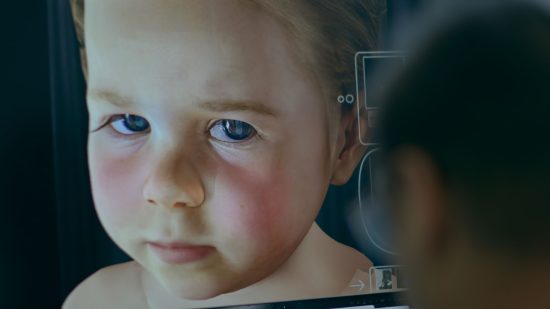Sundance 2024 Film Review: Eternal You

A still from Eternal You by Hans Block and Moritz Riesewieck, an official selection of the World Documentary Competition at the 2024 Sundance Film Festival. Courtesy of Sundance Institute. Photo by Konrad Waldmann.
Eternal You, a groundbreaking documentary premiering at the esteemed Sundance Film Festival, boldly steps into uncharted territory, probing the enigmatic intersection of artificial intelligence and the afterlife. Directed by the insightful duo Hans Block and Moritz Riesewieck, this film delves into the profound and thought-provoking realm where technology meets transcendence.
Artificial Intelligence (AI) has started working its way into many aspects of our every day lives. So much so, that I can tell you that the previous paragraph was written by ChatGPT using only minimal prompts from myself. And no, I promise that I don’t use AI to write my reviews (ever), but wanted to in this instance to demonstrate, and see for myself, just what the platform can manage when you give it a little information. Turns out it’s a lot. ChatGPT wrote about 500 words on this film, that is still under embargo I might add, in about 2 seconds. So, if AI can influence and affect our day to day life this easily, what about after we die?
In Eternal You, directors Block and Riesewieck aim to look at the role that AI is only beginning to play in the afterlife. If you’ve ever watched the series Upload on Prime and wondered if our technology could ever accomplish a digital afterlife, it doesn’t seem too far out of the realm of possibility after you watch this documentary. Start up companies all over the world are trying their hand at making us live forever, long after our bodies are gone.
There’s a lot of money in death and grief. According to Fortune Magazine, funeral homes are a $23 billion dollar industry (as of a September 2022 article). Couple that with a flood of investment in the AI market, and these startups are racing to find a way into the business. But with new tech that can allow us to communicate (falsely) with dearly departed loved ones, or even see them in virtual reality, what are the ethical implications? What are the responsibilities of these AI pioneers that are, essentially, emotionally manipulating the heartbroken and grief stricken? Is this a new way of grieving, a new way to memorialize the dead, or are we stopping people from healing? And if you opt to ‘upload’ yourself, who owns your identity then?
Eternal You follows both the developers of this technology as well as those trying to connect with loved ones. Amongst them is Joshua, a user of a platform called Project December who uses the site to communicate with his deceased fiancé. He feels that the ability is “like a gift, like a weight had been lifted.” The same can’t be true however for Christi, who wants to make sure her loved one is okay in the afterlife. The AI, posing as her first love, tells her he is in hell and that he might haunt her. Two vastly difference experiences that affect the users in profoundly different ways. Yet, founder Jason Rohrer says each user has responsibility for their use of the platform, he doesn’t. At this point the AI itself isn’t even fully understood. What’s clear is that even though users know deep down they aren’t talking to the dead, the ability of AI to speak in their loved ones voices and personality when given just very little data, immerses them in a whole different mindset.
And it’s not just text chat. Some companies have found ways to mimic the dead’s voices so they can speak to their families from beyond the grave. Some create virtual reality avatars that are so lifelike they can bring a 7-year-old girl back to her grieving mother. The fact this was done on a television show, taking advantage of this woman’s immense sorrow, was seemingly a non-issue for producers. You have to wonder what the lasting effects on the human psyche truly are. As one interviewee notes, this technology should be “how to lose them better, not to pretend they’re still here.”
With a quick 87 minute run time for the introduction of so many complexities, Eternal You is always a bit surface level. But, it’s slick and entertaining, with some impressive drone shots alongside a digitally inspired score from Gregor Keienburg and Raffael Seyfried. The film is often a bit creepy, with programmers creating a digital baby (‘Baby X’ in the photo above) and in the way developers talk about how their products should interact with the living. Watching users communicate through Project December has a supernatural feel, especially with the platform seems to display some level of malevolent behaviour. That there is no sense of responsibility for Christi’s trauma, a woman who was just trying to feel some level of closure but was left with more anguish, seems horrific.
The documentary is a bit limited in its scope, mainly because this is such a new industry. There are no answers to the ethical implications that these startups bring to light, and there are many. There are no studies done to show how this affects people, no data to know what harm could be done. Without regulations this could be an incredibly lucrative industry that preys on people’s grief. And considering how quickly AI seems to be evolving you have to wonder if this is just a runaway train. What is the line between emotional connection and exploitation? Eternal You shows, it’s a very thin one. How we live in a world with AI seems to be constantly changing, but so to is the way we die.

Eternal You premiered at the Sundance Film Festival January 20, 2024, with in person screenings as well as online viewing (for U.S. only) available throughout the festival. For more information go to festival.sundance.org









